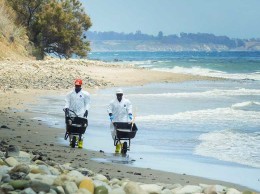ExxonMobil buys damaged Plains All American oil pipeline
IN THIS ARTICLE
- Energy Topic
- Tony Biasotti Author
By Tony Biasotti Tuesday, October 18th, 2022
For more than seven years, ExxonMobil has left its oil in the ground off the coast of Santa Barbara County, with no way to transport it since the rupture of Plains All American’s pipeline near Refugio State Beach.
Now ExxonMobil will take a shot at moving the oil itself, after purchasing the broken pipeline from Plains All American. The deal closed Oct. 13 and covers pipelines 901 and 903, which are two different segments of the line that connects the Gaviota Coast with Kern County to the northeast.
The companies did not disclose any financial details and did make representatives available for interviews about the sale.
Steve Greig, Plains All American’s director of government affairs, said in a statement emailed to the Business Times that the sale is a “mutually beneficial transaction” that “aligns with our strategy of supporting customers while exercising capital discipline.”
Julie King, a spokesperson for ExxonMobil, told the Business Times in an email that the company “will conduct a thorough inspection of the pipelines to determine how to safely and responsibly return them to service.”
Before the 2015 Refugio oil spill, Plains All American’s pipeline carried oil from offshore drilling platforms, including three owned by ExxonMobil, to processing facilities in Kern County.
The pipeline has been out of operation since the spill, and with no way to transport oil, ExxonMobil’s platforms have been shut down, too. In March, the Santa Barbara County Board of Supervisors rejected ExxonMobil’s proposal to move its oil by truck instead.
Plains All American was in the midst of a permit application with the county of Santa Barbara on a plan to rebuild and reopen the pipeline. ExxonMobil will now take over that proposal.
Lisa Plowman, the county’s director of planning and development, said the environmental impact report for the pipeline proposal is “about 80% to 90% done.” Once it’s finished, it will be publicly released and the county’s review process will begin.
The Planning Commission will vote to approve or deny the application, with the Board of Supervisors making the final decision if either side appeals — an appeal that Plowman said will “undoubtedly” happen, whichever way the Planning Commission votes.
Plowman said she doesn’t expect the change of ownership to change the process much. If anything, it could speed things up, since Plains All American has been “a little bit slow to respond to our requests,” she said.
“The process was taking a little more time than we had hoped or expected,” Plowman said. “With Exxon, they have a lot more at stake.”
Without any publicly known details of the sale, “it’s hard to understand” whether it changes the legal situation and whether ExxonMobil is taking on any potential liability, said Leila Noël, an attorney with Cappello and Noël in Santa Barbara who represents plaintiffs in lawsuits against Plains All American.
Plains All American has already agreed to pay $230 million to settle claims from property owners, commercial fishing businesses and others harmed by the spill, along with $60 million in a civil settlement with the U.S. Department of Justice. There are other cases still ongoing, including a criminal restitution case and one regarding easements for a potential replacement pipeline, Noël said.
She expects ExxonMobil to be more motivated than Plains All American was to get the pipeline replaced. And it will need to be replaced, she said, since it is comparable to “Swiss cheese” in its current state.
“Exxon has every reason to want to get the new pipeline in,” Noël said. “They need to have a way to transport their oil.”
Related Articles
 Friday, September 2nd, 2022
Friday, September 2nd, 2022










